Yesterday, the Season 1 airdrop rules were announced, and the TGE is coming soon. How to participate in Yala?
Written by: Alex Liu, Foresight News
The Bitcoin-native liquidity protocol Yala announced its Season 1 airdrop details last night, which will open for claims on the day of the TGE. After launching on the Solana mainnet in May, the Solana Chinese community revealed that Yala will soon have its TGE. What is the background of Yala, what is the protocol's principle, how is Season 1 distributed, and how can one participate in the future?
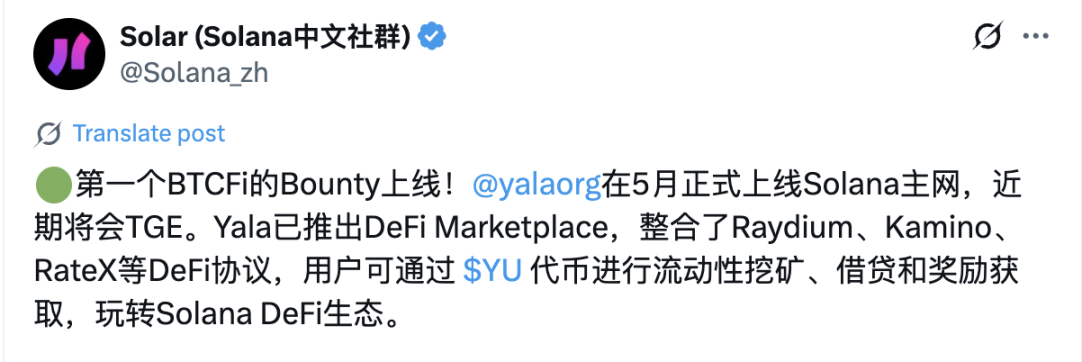
Yala is a Bitcoin-native liquidity protocol that mints the stablecoin YU by over-collateralizing BTC on the Bitcoin chain, linking the value of Bitcoin with multi-chain DeFi and real-world asset (RWA) yields. The protocol aims to allow Bitcoin holders to participate in DeFi and RWA ecosystems without giving up asset ownership, thereby unlocking the long-idle value of Bitcoin.
Financing Situation
Yala completed a $8 million seed round of financing in October 2024, co-led by Polychain Capital and Ethereal Ventures. Other participating investors include Galaxy Vision Hill (Galaxy Digital), Amber Group, HashKey Capital, ABCDE Capital, Anagram, Ambush Capital, GeekCartel, L2 Iterative Ventures, SatoshiLab, UpHonest Capital, UTXO Management, 280 Capital, and others.
The team stated that the funds from this round will primarily be used to expand the technology and product teams, enhance security, and support various preparations before the mainnet launch. Additionally, the Yala founding team disclosed that there is already a commitment of over 2,000 BTC for collateral liquidity in the early stages of the protocol, laying the foundation for the platform's stable operation.
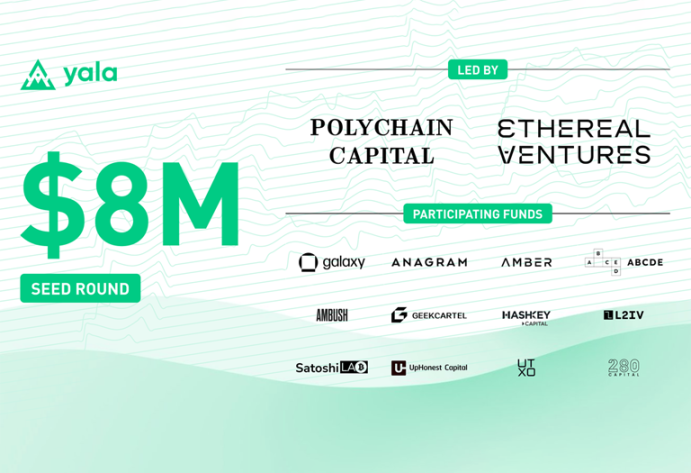
In terms of strategic cooperation, Yala has joined the Circle Alliance Program and will explore the application scenarios of USDC in the Bitcoin ecosystem with other protocols and institutions in the future. Thanks to the collaboration with Circle, holders can exchange YU stablecoins for USDC at a 1:1 ratio, providing trust backing for YU through the widespread acceptance and compliance of USDC.
Yala has also reached a strategic partnership with the Bitcoin Layer 2 network Stacks, integrating YU into Stacks' lending, staking, and insurance protocols, including Bitflow, Alex, Velar, Zest, etc., to enhance the liquidity and stability of the Stacks ecosystem. In July of this year, Yala partnered with the crypto payment gateway Alchemy Pay to launch the Yeti Card, allowing Bitcoin holders to use YU earnings for global consumption.
Team Background
The Yala team members span the fields of crypto and traditional finance. According to official information, Yala's founders include a former MakerDAO protocol architect, a former Circle stablecoin engineer, a Microsoft cloud infrastructure expert, and a former Capital One derivatives trader. The team also includes talents from Lido, Binance Labs, Circle, Microsoft, Alchemy Pay, and other institutions. Among them, co-founder and COO Kai-Tai Chan has worked at Binance and APX Finance, holding an MBA from Harvard Business School and extensive entrepreneurial experience.
Protocol Features
Yala adopts a modular design, with its core divided into several interrelated parts: Yala Bridge, Yala Network (MetaMint), and different user modes.
First, users deposit BTC through Yala Bridge and convert it into yBTC, which is a tokenized representation of Bitcoin (similar to wrapped tokens but generated within Yala's own ecosystem), serving as collateral for subsequent operations. After receiving yBTC, users can directly mint YU stablecoins on the target chain (such as Ethereum, Solana, etc.) through the MetaMint module and participate in staking, lending, and other DeFi activities across chains.
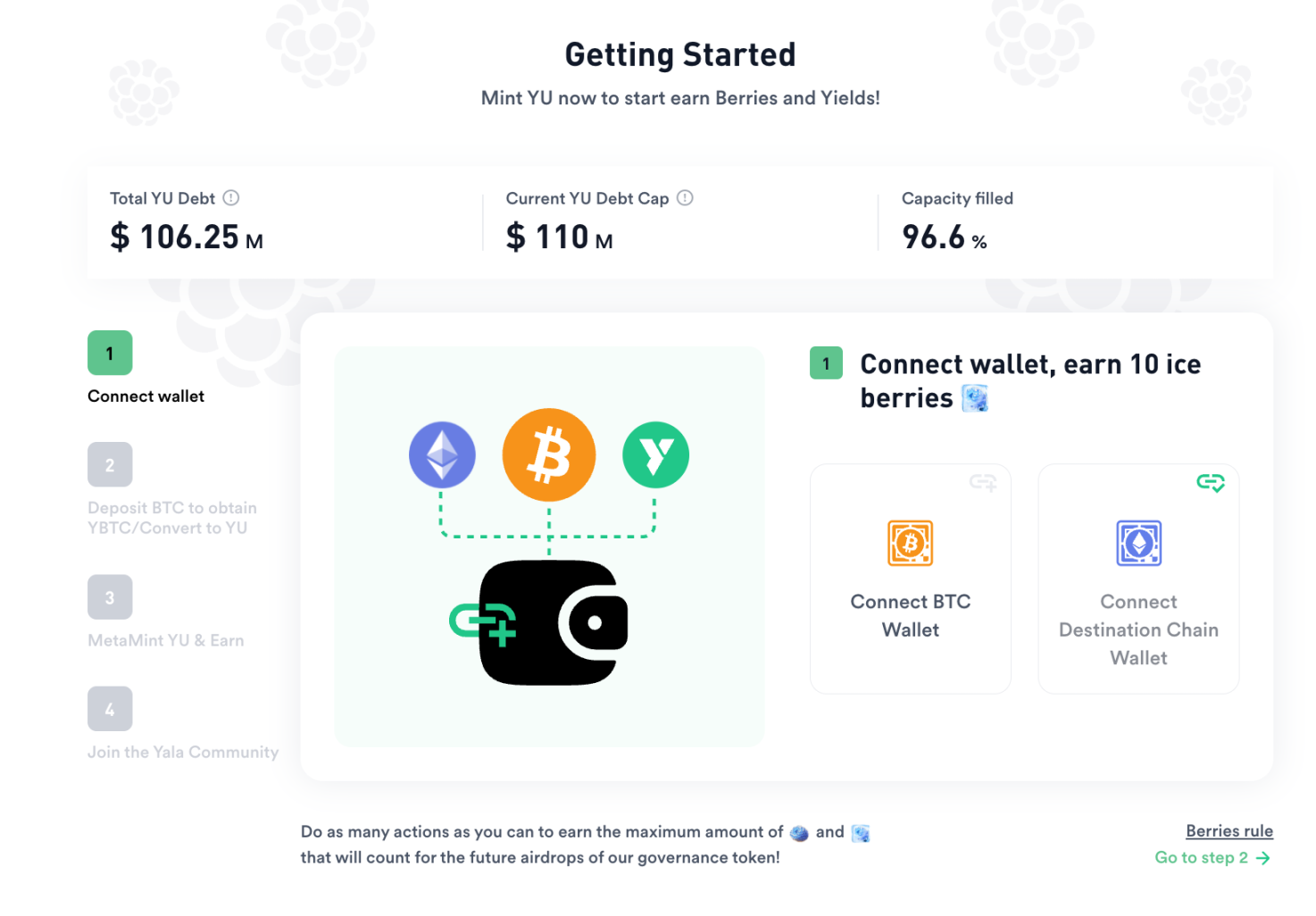
MetaMint simplifies the cross-chain process—users can deposit BTC once and "one-click" obtain YU on other chains without the need to first exchange for stablecoins on an exchange. Additionally, Yala offers a Lite Mode for regular users and a Pro Mode for professional users, allowing regular users to simplify operations and earn stable returns, while professional users can access advanced DeFi structured products like Babylon and Ethena, obtaining additional returns while maintaining BTC exposure.
Yala's stablecoin YU is pegged to the US dollar and is fully collateralized by Bitcoin. Compared to traditional centralized stablecoins, YU features multi-chain compatibility and a revenue-sharing mechanism: it can be used across various chains like Ethereum and Solana, generating income for holders through staking, lending, and other activities. YU's stability is maintained through over-collateralization, stable fees, liquidation mechanisms, and other means. Unlike many stablecoins that rely on third-party custody, Yala distributes system revenues to YU holders, allowing them to genuinely earn income from protocol operations.
In terms of design philosophy, Yala emphasizes both decentralization and security. It is based on Bitcoin's most resilient off-chain state, introducing programmability through the Ordinals protocol, and ensuring security through mechanisms like a federated indexer network and multi-signature vaults. This means Yala does not need to centralize the custody of BTC assets but instead uses a decentralized indexer network to record the states of yBTC and YU off-chain, with the potential for further decentralization in the future.
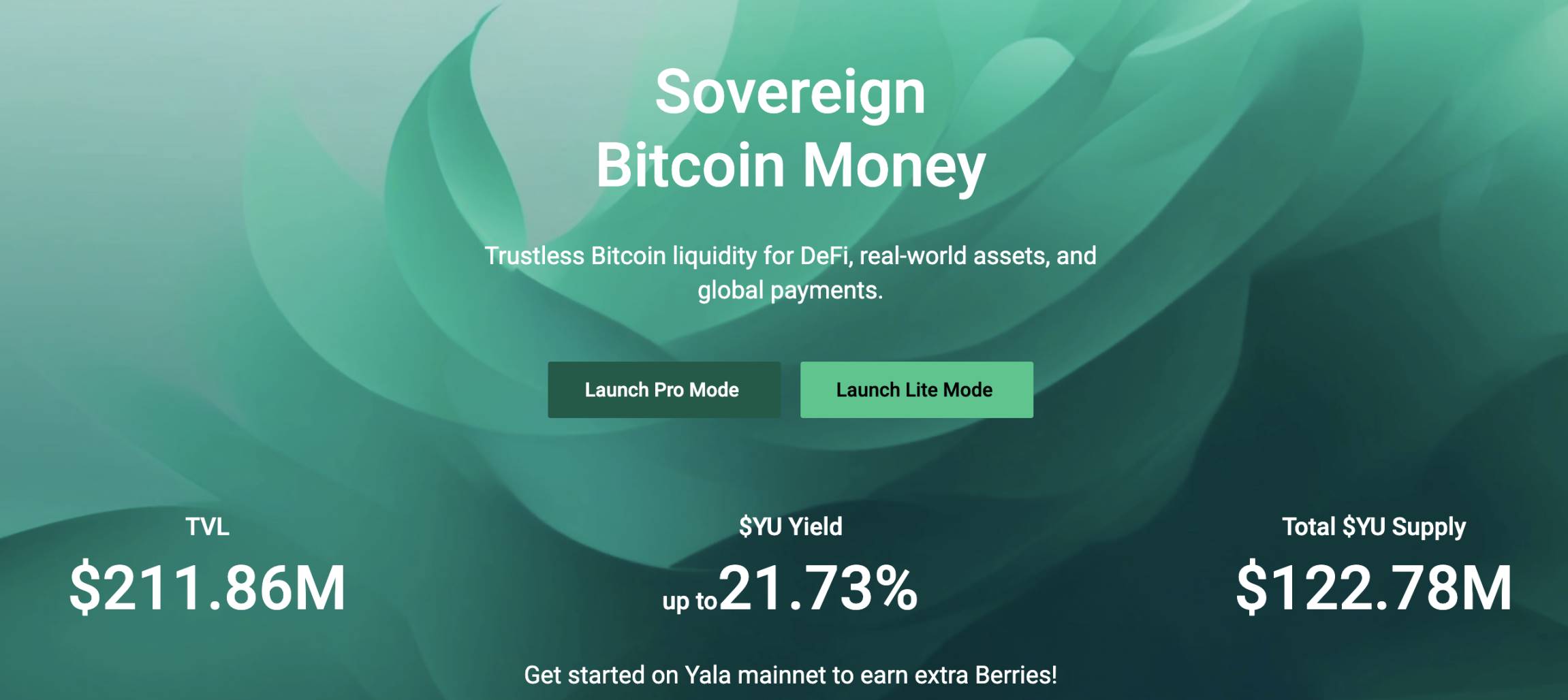
The team claims that the core of the Yala protocol is "true self-sovereignty": all BTC is always stored on the Bitcoin mainnet, allowing users to maintain self-custody and avoid centralization risks. The project officially summarizes its three pillars as: security (BTC remains off-chain, trust-minimized architecture), institutional-grade channels (RWA yield opportunities open to both institutions and retail), and transparent risk management (auditable collateral and strategies).
In terms of user experience and ecosystem integration, Yala also has several innovative highlights. For example, it has launched the PayFi Universe concept, allowing Bitcoin earnings to be directly used for daily consumption through the Yeti Card crypto card. The Yeti Card supports the global Visa/Mastercard network and is compatible with mobile payment methods like Apple Pay and Google Pay. Users can "earn interest on their holdings and spend the interest," allowing them to pay for daily expenses like coffee and shopping without selling their BTC principal.
Additionally, the Yala platform introduces an AI yield agent (Yay-Agent), which integrates DeFi protocols and RWA products to achieve 24/7 automatic yield, providing users with stable annual returns (e.g., Lite Mode offers a fixed return of 12%). Yala's DeFi Marketplace allows users to access liquidity protocols like Raydium and Kamino on Solana across chains from a single interface, earning trading fees and compounding rewards with YU, and obtaining additional incentives through Berries points.
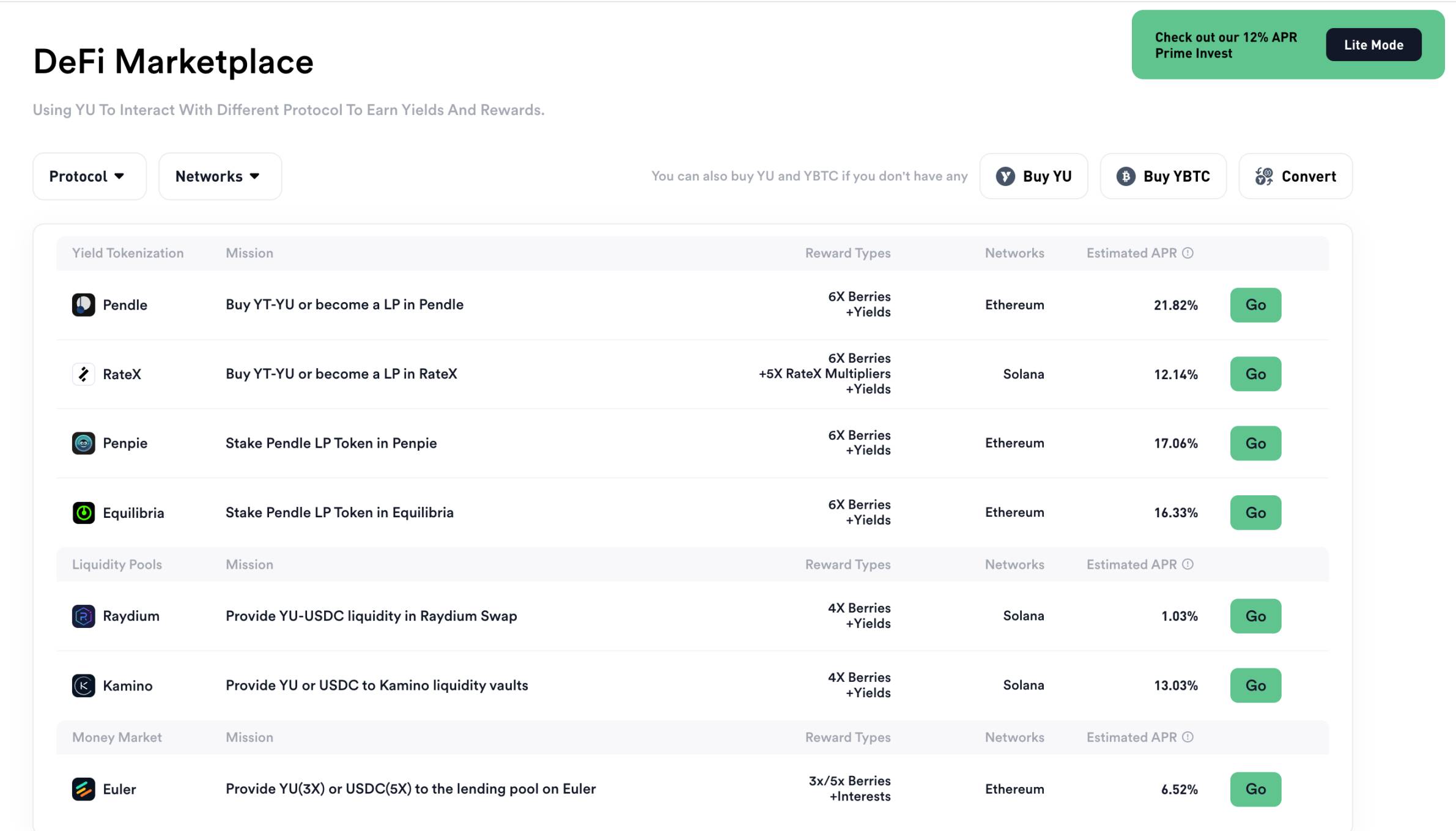
How to Participate
Taking the Ethereum mainnet as an example, users can deposit Bitcoin into the protocol through the Yala Bridge gateway to obtain an equivalent tokenized Bitcoin. Then, users can use yBTC as collateral to mint YU stablecoins on Ethereum or other supported chains with one click using the MetaMint feature. Once minted, YU is directly deposited into the user's EVM chain wallet or Solana wallet. Subsequently, users can deposit YU into the protocol's stable pool to earn staking rewards or provide liquidity in the DeFi marketplace (e.g., by investing in the YU/USDC pool on Raydium).
All on-chain activities will generate rewards—while users earn YU, they can also receive berry points (Berries) from the platform. These points represent the user's contribution to the ecosystem and can be used in the future to redeem rewards or participate in future airdrops. Currently, users can also participate in activities like "team competitions," forming teams to jointly enter lotteries and further accumulate points.
Yala has initiated various community incentive activities, including "Yeti Yell," where users can earn additional rewards by participating in activities, creating content, or completing official tasks. At the same time, Yala has issued limited Yeti soul-bound NFTs (Soul-Bound Yetis) as a badge of honor for early users and contributors. Currently, the NFT Phase 0 has ended, with a total of 1,500 NFTs minted. Phases 1 and 2 will have 3,000 and 5,500 NFTs available for minting, respectively, aimed at users and ecosystem participants ranked high in testnet and mainnet points, which have not yet opened.
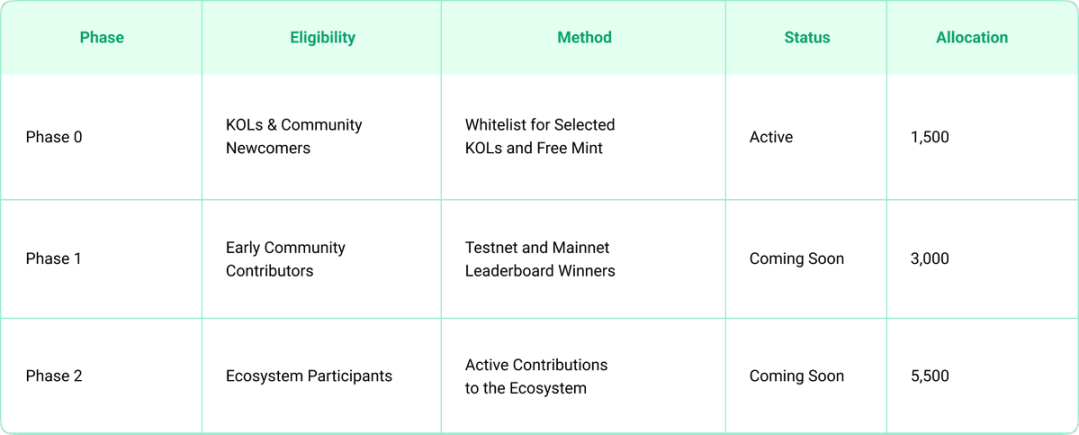
Season 1 Airdrop
The total amount for this airdrop is 34 million YALA, accounting for 3.4% of the total supply, with rewards covering mainnet and testnet participants, content contributors, and early supporters. The claim period is one month. The snapshot date is July 8, 2025, with the specific distribution as follows:
Mainnet Berries contributors: 30 million YALA; Mainnet Ice Berries (social and interaction tasks) contributors: 618,000; Testnet Berries participants: 322,000; Yeti Footprints content/research/feedback/technical contributors: 3 million; Yala Bonus Rewards special reward pool for early supporters: 60,000. Users can check their eligibility for claims on the website. Unclaimed portions will be automatically reclaimed and used for future airdrops. The Season 2 airdrop event has also begun.
免责声明:本文章仅代表作者个人观点,不代表本平台的立场和观点。本文章仅供信息分享,不构成对任何人的任何投资建议。用户与作者之间的任何争议,与本平台无关。如网页中刊载的文章或图片涉及侵权,请提供相关的权利证明和身份证明发送邮件到support@aicoin.com,本平台相关工作人员将会进行核查。




